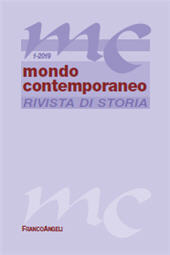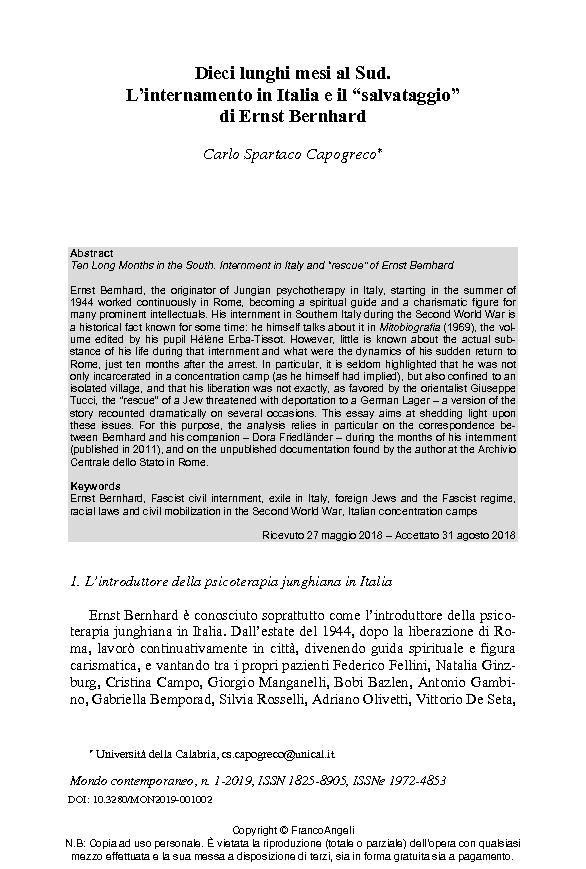Dieci lunghi mesi al Sud : l'internamento in Italia e il salvataggio di Ernst Bernhard
35-58 p.
Ernst Bernhard, l'introduttore della psicoterapia junghiana in Italia, dall'estate del 1944 lavorò continuativamente a Roma, divenendo per molti importanti intellettuali guida spirituale e figura carismatica. L'internamento nel Sud Italia di Bernhard, durante la seconda guerra mondiale, è un dato storico noto da tempo: egli stesso ne parla in Mitobiografia (1969), il volume curato dall'allieva Hélène Erba-Tissot. Poco conosciute, invece, sono l'effettiva consistenza di quell'internamento e le dinamiche del rapido rientro a Roma, a soli dieci mesi dall'arresto. In particolare, poco noto è il fatto che Bernhard non fu relegato solo in un campo di concentramento (come egli stesso aveva lasciato intendere), ma anche in un paesino isolato; ed il fatto che il suo proscioglimento, favorito dall'orientalista Giuseppe Tucci, non corrispose, propriamente, al "salvataggio" di un ebreo minacciato di deportazione nei Lager, di cui si è scritto sin qui, con enfasi, in più occasioni.
Questo saggio si propone ora di fare chiarezza su tali questioni. E, per tale scopo, si appoggia, soprattutto, al carteggio intercorso tra Bernhard e la compagna durante i mesi dell'internamento (pubblicato nel 2011 a cura di Luciana Marinangeli) ed alla documentazione inedita reperita dall'autore presso l'Archivio Centrale dello Stato di Roma. [Testo dell'editore].
Ernst Bernhard, the originator of Jungian psychotherapy in Italy, starting in the sum-mer of 1944 worked continuously in Rome, becoming a spiritual guide and a charismatic figure for many prominent intellectuals. His internment in Southern Italy during the Second World War is a historical fact known for some time: he himself talks about it in Mitobiografia (1969), the volume edited by his pupil Hélène Erba-Tissot. However, little is known about the actual substance of his life during that internment and what were the dynamics of his sudden return to Rome, just ten months after the arrest. In particular, it is seldom highlighted that he was not only incarcerated in a concentration camp (as he himself had implied), but also confined to an isolated village, and that his liberation was not exactly, as favored by the orientalist Giuseppe Tucci, the "rescue" of a Jew threatened with deportation to a German Lager - a version of the story recounted dramatically on several occasions.
This essay aims at shedding light upon these issues. For this purpose, the analysis relies in particular on the correspondence between Bernhard and his companion - Dora Friedländer - during the months of his internment (published in 2011), and on the unpublished documentation found by the author at the Archivio Centrale dello Stato in Rome. [Publisher's text].
Fait partie de
Mondo contemporaneo : rivista di storia : 1, 2019-
Articles du même numéro (disponibles individuellement)
-
Informations
Code DOI : 10.3280/MON2019-001002
ISSN: 1972-4853
DISCIPLINES
KEYWORDS
- Ernst Bernhard, internamento civile fascista, esilio in Italia, ebrei stranieri e regime fascista, leggi razziali e mobilitazione civile nella seconda guerra mondiale, campi di concentramento italiani
- Ernst Bernhard, Fascist civil internment, exile in Italy, foreign Jews and the Fascist re-gime, racial laws and civil mobilization in the Second World War, Italian concentration camps



